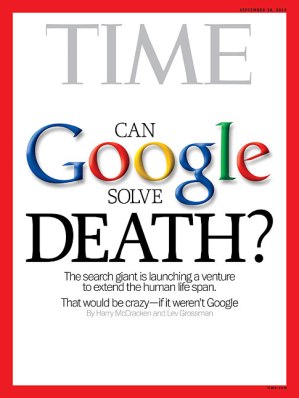Larry Page at Google's headquarters in Mountain View, Calif.
Can Google, the technology giant best known for search and free email, tackle aging?
The Mountain View, Calif.-based company is planning to launch Calico, a new firm that will attempt to solve some of health care‘s most vexing problems. One of the independent venture’s major initiatives will be significantly expanding human lifespan. Arthur Levinson, the former chief of biotech pioneer Genentech, is an investor in Calico and will serve as its CEO.

The Sept. 30 issue of TIME profiles Google co-founder and CEO Larry Page as well as his decision to launch Calico.
Based in the Bay Area, not far from Google’s headquarters, Calico will be making longer-term bets than most health care firms. “In some industries, it takes ten or 20 years to go from an idea to something being real. Healthcare is certainly one of those ares,” said Page. “Maybe we should shoot for the things that are really, really important so ten or 20 years from now we have those things done.”
Google is announcing Calico in a Google+ post Wednesday. Details of the company’s funding and employee head count were not available as of press time.
Google is keeping its exact plans close to the vest. But it is likely to use its data-processing might to shed new light on age-related maladies. Sources close to the project suggest Calico will start with a small number of employees and focus initially on researching new technology.
That approach may yield unlikely conclusions. “Are people really focused on the right things? One of the things I thought was amazing is that if you solve cancer, you’d add about three years to people’s average life expectancy,” Page said. “We think of solving cancer as this huge thing that’ll totally change the world. But when you really take a step back and look at it, yeah, there are many, many tragic cases of cancer, and it’s very, very sad, but in the aggregate, it’s not as big an advance as you might think.”
Levinson, the firm’s leader, has had a storied career. A biochemist with a Ph.D. from Princeton, he rose through the ranks to become CEO of Genentech in 1995. Levinson, who was previously a director at Google, is currently the chairman of both Genentech and Apple‘s boards. He replaced the latter company’s co-founder Steve Jobs after his death in 2011. Levinson was not immediately available for comment.
Forming an entirely separate company as a way of expanding its ambitions is a new move for Google under Page. Far-out projects such as Google Glass, a pair of Internet-connect spectacles, and its self-driving car initiative are run out of Google X, the company’s secretive research arm headed by co-founder Sergey Brin. But Calico will be a separate entity.
“For me, it was always unsatisfying if you look at companies that get very big, and they’re just doing one thing,” Page said. “Ideally, if you have more people and more resources, you can do more things, get more things solved. We’ve kind of always had that philosophy.”
Calico is in line with Page’s oft-stated belief that the company should be aiming not just to make the world a little better, but a lot better. Page urges Google employees to engage in so-called 10x thinking—aspiring to create inventions which are better than anything that already exists by at least an order of magnitude.

